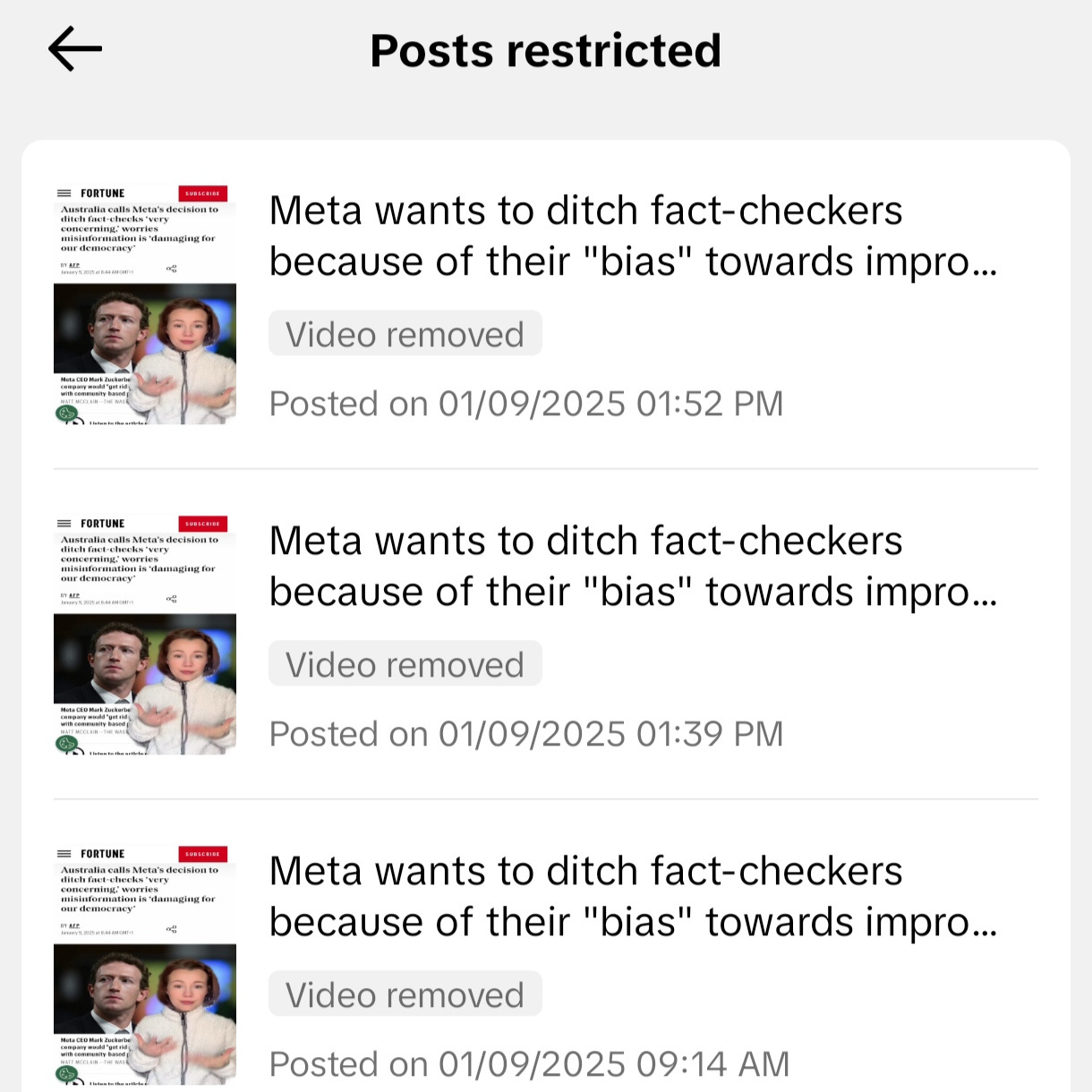Hot Take: A New Opportunity for Political Education on Social Media?
Meta's move towards post-truth fascism could backfire in educators' favour
Yesterday, I scripted, recorded and posted a video explaining why expert opinions are important, but also biassed, based on social media’s slide into fact-free, post-truth fascism. Unsurprisingly, TikTok flagged the video as soon as it was uploaded.
The video was flagged, restricted and removed because it violated TikTok’s community guidelines—the type of guidelines Meta will now do away with. TikTok has spent the last few years desperately leaping through every regulatory hoop the US government throws its way. Creators often report that content critical of the US regime or antithetical to conservative American values is often flagged and repressed, potentially in accordance with US policy. Meanwhile, homegrown American social media companies have faced little to no scrutiny since Facebook’s interference in the US and UK elections of 2015-16. Meta and X seem to have explicitly benefitted from their government dismantling their only major competitor.
This same video, blocked by TikTok for criticising its competitors, fared fairly well on Meta’s Instagram and its Twitter-like extension Threads.
While it seems fairly clear that Meta’s leader is motivated by corporate survival and is (at best) ambivalent towards democracy, I wonder whether this might be an opportunity for those of us involved in sharing political and educational resources online.
Political scientists versus political pundits
As I explained in yesterday’s video (which I shared here on Substack), I’m a political scientist; I’m very literally paid to spend an appropriate amount of time (years) collecting and processing data before coming to any conclusions. While political pundits and news journalists are responsible for getting information out as soon as possible, I’m responsible for getting information out as accurately as possible. As a political scientist on social media, I try to balance between the two demands by leaning on the best practices of my discipline, like citing references.
Producing knowledge takes time. For better or worse (ahem, labour rights), it is a more-than-full-time job.
Being able to spend this much time specialising in a subject is a luxury. As such, it is a privilege still largely gate-kept by predominantly white males who either come from or study in the United States and Europe—particularly, the United Kingdom, Germany, France and Switzerland. Most already-existing political science knowledge—which experts must read, cite, refute or confirm in order to produce new knowledge—was produced by this narrow demographic.
Political scientists, just like political pundits, are biassed in favour of this demographic.
Even the “left-wing” branches of the academy, which conservatives often call out for being “woke” and anti-white-male, are positively biassed towards wealthy white men by default of the history and funding arrangements of higher education. The Frankfurt School of philosophical thought, associated with scholars like Theodor Adorno and Jürgen Habermas, has been huge in directing political science for the last hundred years. It set out to achieve "human emancipation" and is based on socially-conscious, progressive thought like Marxism and socialism. Yet, it was still funded by wealthy European elites.
While political science does a relatively good job, at trying to overcome the class structures of conservative societies—at least philosophically—it struggles to mitigate international class structures of coloniser and colonised.
An opportunity for political education?
With our inherent biasses in mind, Meta’s move away from restricting political content could be an opportunity for progressive-minded and social media savvy educators. In a sea of fact-free, post-truth nonsense, we offer something more valuable.
At the same time, in the US at least, Instagram remains a women-led platform, with 55% of users identified as female. Unlike Facebook, the majority of Instagram users are also young, with the 18-34 age bracket dominating the app.
Having proven able to engage this demographic—whether on TikTok, Instagram or elsewhere—we can prepare for Meta’s inevitable deregulation by leveraging our first-mover privileges. Innovative creators like
, who explains politics, economics and history “for the girls”, have a ready-made formula for turning Meta’s deregulation into an opportunity to educate.Keep creating valuable, quality content
As the TikTok era potentially comes to an end, it is more important than ever that we transfer our human capital—our skills, audiences, and (most importantly) good research practices—between platforms. Coco Mocoe, who made a name for herself predicting social media trends, has already shifted her focus here, to Substack. Tech and politics educators like Morten Rand-Hendriksen operate across TikTok and LinkedIn.
Meta’s deregulation could be an opportunity to diversify, but only if we consistently offer valuable, quality content and (most importantly!!) references.
As promised in my first Substack, here is this week’s “Academic to Watch”, another public scholar who has proven more than able to navigate multiple social media platforms: Dr. Gabriel A. Cruz. His new book Latinidad, Identity Formation, and the Mass Media Landscape came out last month, but you can find him breaking down his (huge) topic over on TikTok and Instagram.








I have trouble believing that Meta won’t do “free speech for me(white christofascism) but not for thee” and suppress liberationist content (eg. Pro Palestine)
Thanks! Was considering leaving Facebook because of the changes and now you are enticing me to keep plugging away at educating those I can reach….